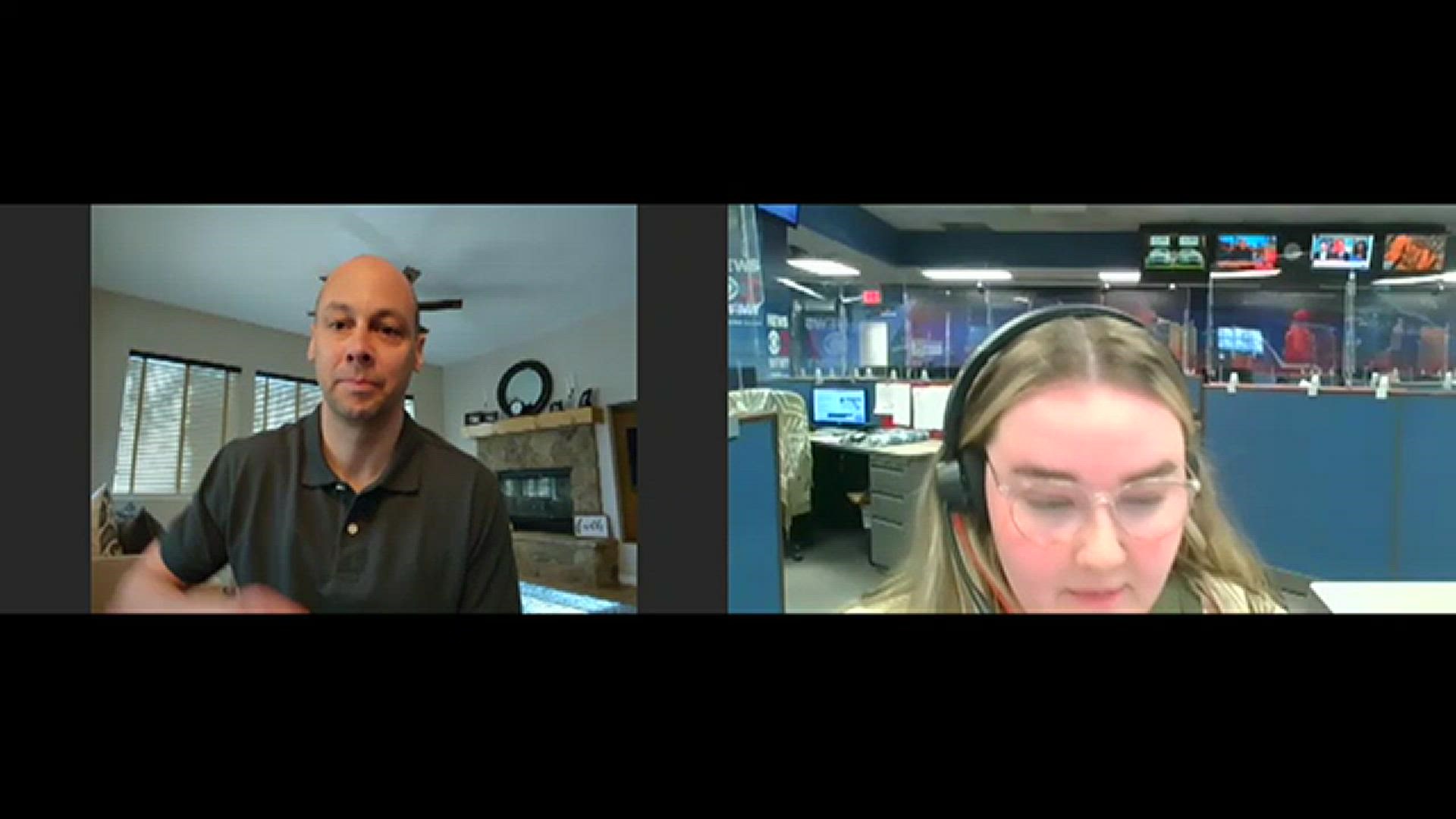RALEIGH, N.C. — It's January 2009. President Barack Obama is sworn into his first term in office, the 'swine flu' is declared a global pandemic, a plane crash-landed into the Hudson River, and Israeli Defense Forces launched a ground strike on the Gaza Strip. It's also the last time someone in prison was granted clemency in North Carolina.
That's until Thursday when Governor Roy Cooper commuted three peoples' sentences. All were convicted for crimes committed when they were teenagers.
Who got clemency?
Governor Cooper's office said among those receiving clemency are 37-year-old Joshua McKay, who served 20 years in prison for a murder he was convicted of at age 17 in Richmond County, and 42-year-old Anthony Willis, who served 26 years for a murder he was convicted of at age 16 in Cumberland County.
The third person on the list is April Leigh Barber. The now 46-year-old Wilkes County native has served 30 years in prison for her role in the murders of her grandparents at age 15. At the time, she was pregnant with her 29-year-old boyfriend's baby.
Barber spoke exclusively with WFMY News 2's Chad Silber in 2015 about the killings.
She said she wanted to keep the baby but knew her grandparents wouldn't approve, so she devised a plan with her boyfriend.
The night of Sept. 4, 1991, Barber and her boyfriend poured gasoline in her grandparents' house and set fire to it. Aaron Barber died in the blaze. His wife Lillie died days later from her injuries in the fire.
Barber told us in 2015 why she felt she deserved clemency. Now, that's what she's getting.
Her attorney Don Vaughan said Barber could be released in about two weeks and that she has a job lined up to be a paralegal.
What is clemency?
Not to be confused with a pardon, clemency is the modification of a prison sentence.
"What it means is that the person is released from incarceration, subject to the conditions that are placed on them by Governor Cooper," said Jamie Lau, Deputy Director of the Center for Criminal Justice and Professional Responsibility at Duke Law. Lau was also part of the team that helped Anthony Willis petition for clemency.
The governor's office said the conditions for Barber, McKay and Willis include not committing felonies, misdemeanors or impaired driving offenses. They cannot own or possess firearms or deadly weapons. And they cannot assault, harm or threaten any person and they can't leave the state without permission.
"(It's) just to make sure that they are continuing to engage in the same positive behaviors that they were demonstrating while incarcerated," said Lau.
Why now?
The commutations of Barber, McKay and Willis' sentences are the first recommended to the governor by the Juvenile Sentence Review Board. It was established by an Executive Order last year as part of Gov. Cooper's Task Force for Racial Equity in Criminal Justice (TREC).
"Of juveniles who commit murder and are sentenced to life without the possibility of parole, 80% of juveniles who receive that sentence are Black," said Lau. "So there's a real racial disparity in the sentencing with respect to Black and white individuals who are sentenced to life without parole as teenagers."
The Review Board is made up of four attorneys. The governor's office said they have years of experience in the criminal justice system, including work as prosecutors, judges, defense attorneys and lawmakers.
They are:
- Marcia Morey: Former District Court Judge in juvenile court, former Assistant District Attorney in Durham
- Mickey Michaux Jr.: Former US Attorney for Middle District of North Carolina, member of N.C. General Assembly
- Thomas Walker: Former US Attorney for Eastern District of North Carolina, former lawyer at N.C. Attorney General's office
- Allyson Duncan: Former judge on U.S. Court of Appeals for Fourth Circuit and N.C. Court of Appeals
"It's not a lot of soft-on-crime individuals," said Lau. "It's people with an intimate experience with the criminal justice system and sentencing practices."
How does someone get their sentence commuted?
When it comes to the clemency petition process, Jamie Lau said there are a lot of unknowns.
"It's not a set system. The governor has the absolute authority to issue commutations to issue pardons of innocence, pardons of forgiveness," said Lau.
The qualifications for clemency vary by governor, and the exact specifications are not known.
In an article for the Wilson Center for Science and Justice at Duke Law, Lau and colleague Ben Finholt wrote about one of the rules. "People eligible for parole are ineligible for clemency. An informal poll of clemency advocates in North Carolina revealed that not one person was aware of this restriction until recently, though Gov. Cooper has been in office for over 4 years."
"I've been a big advocate for transparency as to what those rules are for each governor, and even including Governor Cooper," said Lau. "The rules that we write about are the rules that we know from the governor's clemency office, but those aren't specifically being applied by Governor Cooper."
Without knowing the rules, all someone in prison can do is submit a petition and hope they're eligible.
The governor's office said some N.C. law schools and advocates provide pro bono legal help for those hoping to have their sentence reviewed.
That's how Lau became a part of Willis' petition for clemency.
"It was on the basis of someone reaching out to us and saying 'there's an individual, he's an amazing human being deserving of a second chance, and you should see all the work that he's done to improve himself,'" said Lau. "Mr. Willis, Ms. Barber, they do the hard work because they're incarcerated. And they have to take advantage of what opportunities there are while incarcerated to improve themselves as a person."
In this case, Lau and his team put together a packet about Willis. It included information about the case and what efforts a person made to become a positive individual while incarcerated and what they can eventually contribute to society upon release.
That packet went to the Juvenile Sentencing Review Board. Then when the board vetted the packet, it headed to the governor's desk.
"I like to say our work here is kind of at the end, after the person's put in the really long and hard work that it takes to show you're someone different to that," said Lau.
What does this mean for the community?
While the crimes Barber, McKay and Willis are convicted of happened decades ago, some people are still concerned about them reentering society.
Lau spoke about Barber's case. Remember, she was convicted when she was just 15 years old.
"Sentencing her to the rest of her life when she's going to mature and could become a positive contributor to society, you know, seems too far in my eyes with respect to a proportional punishment for her role in the crime," said Lau. "Now people can disagree with me on that, I understand. I mean, it's a horrific crime. At the end of the day, two people lost their lives."
Lau argued two points for the benefits of clemency. The first is that this is a better process to ensure the safety of communities.
"These individuals who received grants of clemency from the governor have demonstrated over the course of decades really -- Ms. Barber has been incarcerated for 30 years -- that they have turned their lives around," said Lau.
"In a way, a lot of people who commit the same act don't have to necessarily demonstrate (that they've turned their lives around) because of the way that their attorneys were able to secure them deals at the bargaining stage."
Lau also said the clemency process benefits the state.
"When people in prison understand that the efforts they put in could have a beneficial impact on their ability to someday be free, it improves the quality of working conditions in those facilities," said Lau. "It improves the safety in those facilities, and it helps the state recruit people for those jobs (and) maintain the public safety generally."
Lau said the clemency process shows N.C. has a system that gives people opportunities to be somebody beyond their past.
"Ms. Barber, Mr. Willis, Joshua McKay, I have the utmost confidence that they are going to live outstanding lives moving forward, make this governor proud of the action he took," said Lau. "And I hope our state and the people of this state can show the same mercy towards these individuals that the governor did because they've worked so hard to become someone different."
WATCH THE FULL CONVERSATION WITH JAMIE LAU


